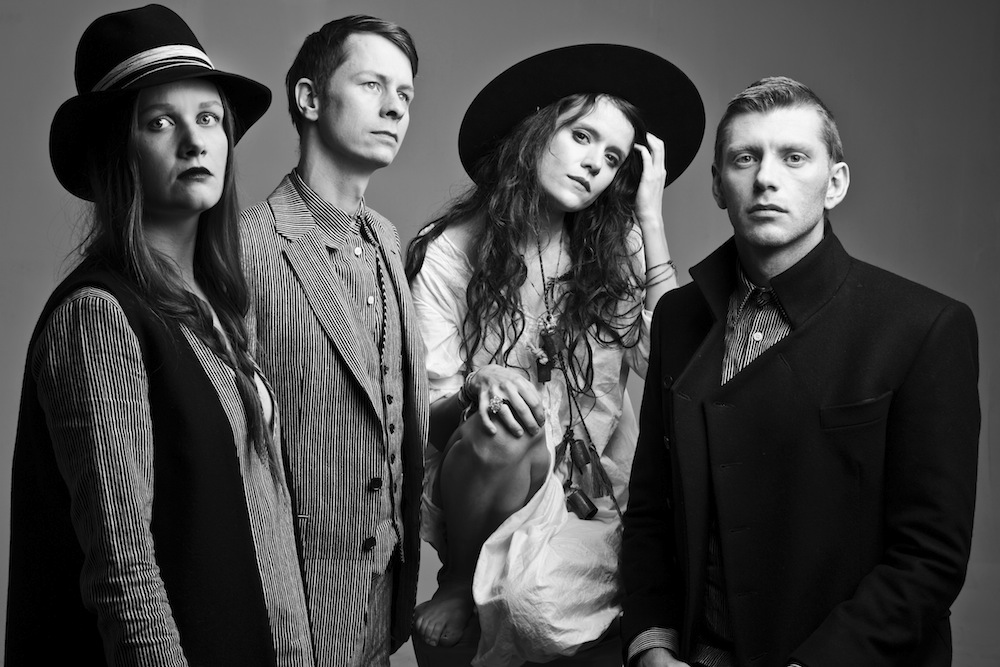Múm’s the Word

Múm is a band that is difficult to describe in typical music journalism terms. They don’t really have a genre—even founding member Örvar Þóreyjarson Smárason feels as though he is “lying” when he attempts to pin down what they sound like. They don’t rely on a predetermined set of instruments, instead employing a rotating cast of guitars, synthesizers, drums, tambourines, woodwinds, trumpets, accordions, bells—a veritable smörgåsbord, if you will. Múm’s members seem to come and go as they please, taking time off to play in other bands, write novellas, have children, or pursue higher education. One could describe them as Icelandic, but their drummer is from Finland, so even that might be a stretch.
Múm’s latest record, Smilewound, is their sixth full-length since they assembled in the late ’90s. Call them what you will—a collective, an experiment, an instrument-wielding traveling circus—there is something so refreshing about Múm’s organic philosophy. We would hazard to guess that if more bands only made music when they “really felt like it,” there would be far less terrible music out there in the universe. We caught up with Smárason about his unorthodox band, their new album, and being a father while his daughter sang in the background.
ALLYSON SHIFFMAN: You’re in Iceland right now?
ÖRVAR ÞÓREYJARSON SMÁRASON: Yeah.
SHIFFMAN: I’m so jealous. It’s beautiful there.
SMÁRASON: Don’t be jealous. It’s actually pretty gray now.
SHIFFMAN: It’s been a few years since Múm has put out an album. What have you been up to in the meantime?
SMÁRASON: There’s usually at least two to three years between albums for us. This time was no different. I went to school and continued my studies.
SHIFFMAN: What did you study?
SMÁRASON: I’m studying cinema: cinema theory, cinema history. Gunnar mostly works as a producer and a sound engineer, and we all play with different projects. I’m in another band called FM Belfast and I was touring with them.
SHIFFMAN: I get the sense that every Icelandic musician plays in several bands.
SMÁRASON: About eight years ago I was probably in around 10 or 15 different bands. In the end I really needed to scale it down just to get some time to sleep, but it happens a lot here. Everyone who plays with Múm is in at least two or three others. It makes planning tours really complicated because everyone needs to take account of the other people’s touring. That’s also why we switch members.
SHIFFMAN: Yes, the members of your band are constantly changing. Did you set out with that in mind?
SMÁRASON: We didn’t set out to do anything. [Mine and Gunnar’s] only aim was to make a lot of music in his basement. After that we progressed into a live band and very quickly we thought the only way we would continue doing this is if when somebody had to do something else, we would just get somebody else in. We had a big group of friends, so it was really easy from the beginning.
SHIFFMAN: Getting a tour together must be a logistical nightmare.
SMÁRASON: It’s ridiculous. Sometimes I’m trying to explain it to promoters, but they don’t understand until it happens. Everyone is in different places and touring at different times. Gyda is in a band—we never know where she’s going to be before a tour. We can’t buy a flight for her until a week before. Our drummer is from Finland and we work with people from all over… so yeah, it can be a nightmare. Planning the logistics is not the most fun part of the job.
SHIFFMAN: …But probably worth it to get a nice chunk of time together?
SMÁRASON: Of course. My favorite part of the tours is always when we meet up the first day, the night before we play our show. We go out together for a meal or something.
SHIFFMAN: How would you say this album differs sonically from previous albums?
SMÁRASON: It’s really electronic. A lot of the songs come from small, electronic instruments… [pauses] I don’t know how to describe it. I’m always trying to, but when I say it, it sounds so boring [laughs]. I’d rather people just listen to it.
SHIFFMAN: Did you really get the album name from fan suggestions on Twitter?
SMÁRASON: [laughs] No, we actually didn’t. For fun, we asked people to come up with names for the album and there were a lot of really funny things that came up. We also sent an email to all our friends and from one of those we got the idea for the title. There’s a song on the album called “The Colorful Stabwound” and another one called “One Smile” and our friend thought it would be really funny if we twisted them around.
SHIFFMAN: I’m curious about your writing process, because it seems as though you are rarely all in one place. Who is writing the songs?
SMÁRASON: Our writing process is pretty random. “Sweet Impressions” is probably the only song on the album that’s written in a band kind of way. Usually me and Gunnar write together. One second, sorry [speaks in Icelandic to daughter] she’s singing so loudly.
SHIFFMAN: [laughs] That’s been her singing in the background this entire time?
SMÁRASON: She’s been singing constantly for five hours now. It gets louder and louder and louder. It’s summer vacation.
SHIFFMAN: Does she listen to your music?
SMÁRASON: Sometimes. She’s going to come see a show tomorrow and I’m looking forward to that. Tomorrow is Gay Pride, which is a really big thing in Iceland—almost one third of the country marches—so there’s a big show downtown and I’m playing with FM Belfast.
SHIFFMAN: Has she seen you play before?
SMÁRASON: Yeah, but not for a while. She came to All Tomorrow’s Parties with me one time. She liked Steve Malkmus most of all, I remember.
SHIFFMAN: What’s one solid piece of advice you’ve given your daughter?
SMÁRASON: [laughs] I’ve been telling her the last few days that she shouldn’t become an artist. I know it’s really wrong and I’m mostly saying it as a joke, but she should become something that makes money so she can provide for the family. [laughs] So I won’t need to worry about it when I get old.
SHIFFMAN: [laughs] That’s why you’re telling her to stop singing in the house. You mentioned you’re in school for film. Is that something you plan on pursuing professionally?
SMÁRASON: No, I just enjoy watching film, I wouldn’t really want to make film. It seems like a really heavy and chaotic process.
SHIFFMAN: What sorts of films are you drawn to?
SMÁRASON: I like a lot of German cinema from the ’20s and the ’30s. I spent most of my time studying that. Also Italian cinema from just after the Second World War.
SHIFFMAN: I want to go to film school just to learn. That sounds incredible.
SMÁRASON: It’s a really good thing to do. It’s completely unpractical, but watching classic films and reading about them and thinking about them is such a nice way to spend your day. It’s also a good window into the history and philosophy of the 20th century and just how ideas develop and evolve.
SHIFFMAN: You’ve been on tour this summer. What has been a highlight?
SMÁRASON: We had a tour of Asia in June. I actually had a second daughter the day before I left, which wasn’t perfect, but it was really, really a lot of fun. We went to Japan, Taiwan, Hong Kong, and Singapore. Playing All Tomorrow’s Parties in Iceland was really nice. We had a beautiful show in Italy a couple weeks ago in a monastery courtyard in a tiny town. I think there were more people at the show than actually lived in the whole village.
SHIFFMAN: It must be such a pleasure to have the opportunity to play these massive festivals but also more intimate, historic venues. Do you have a preference?
SMÁRASON: We love to play these small outside shows. People put a lot of work into shows like that. There’s so much more love in it than your everyday club show. It doesn’t really get any better than playing on a warm summer night in some beautiful square after having had an amazing meal. That’s probably the best it gets for us.
SMILEWOUND IS OUT NOW.






